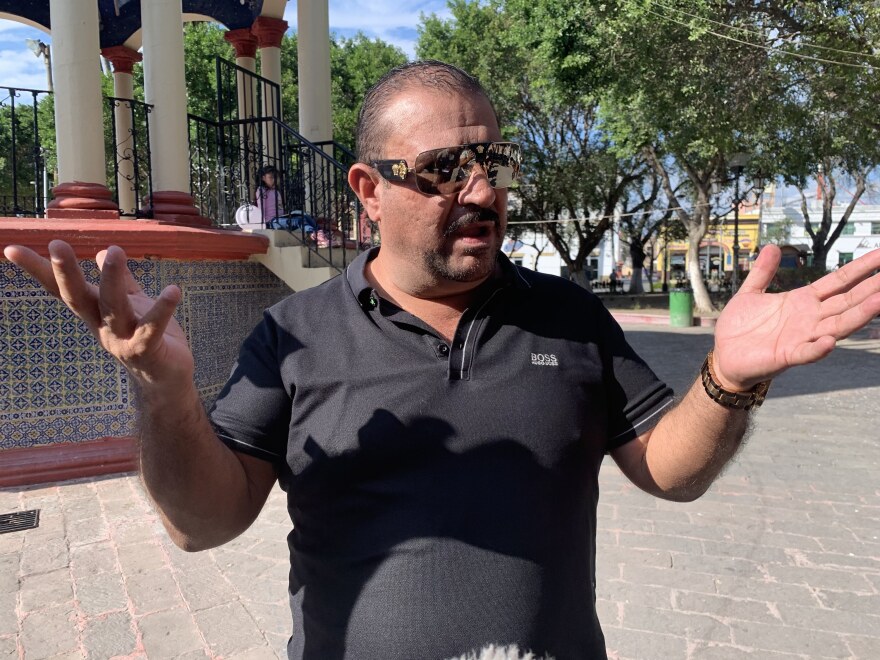Dozens of people gathered on Sunday in Matamoros, Mexico to protest the more than 2,500 asylum seekers living in their city in a tent encampment near the Gateway International Bridge.
The asylum seekers are forced to wait in Mexico for months as they wait for their asylum claims to unfold in U.S. immigration court, under the Trump administration’s Remain in Mexico policy, formally known as Migrant Protection Protocols. The policy has returned more than 57,000 asylum seekers across the U.S.-Mexico border since it went into effect last year.
The migrants, who have been waiting in Matamoros, have not been welcomed by the US or Mexican governments. And some locals wanted to send that same message on Sunday.
Alberto Rivera Sanchez has lived in the city since the 80s. He organized the protest because he believes there’s been an uptick in crime since the migrants started arriving in the tent encampment and he doesn’t think all the migrants are asylum seekers.

“I speak for my city, I speak for Matamoros, I speak what I see,” Rivera said. “I have friends with immigration and they tell me they don’t even know who they are.”
Rivera and his supporters also said they worry about the spread of diseases, like HIV.
Melissa is an asylum seeker from Honduras who only wanted her first name used because she feared speaking out will hurt her claim for asylum. She said this rhetoric is racist and makes her fear for her safety.
“At first I was scared because we would hear the rumor about the protest and it being close to us,” she said.
Abraham Barberi is a pastor in Matamoros and visits the tent encampment frequently, about three or four times a week. He showed up to counter the protest and show Rivera why he supports the migrants.
“This protest is based on false accusations. They’re accusing the asylum seekers of rape, prostition, drug activity, alcohol activity and other things,” Barberi said. “The thing is the man who is doing the protest, he has no evidence at all. It’s just what he heard.”
Cindy Candia is with the Angry Tias and Abuelas, a local organization in the Rio Grande Valley that helps asylum seekers on both sides of the border. She also attended the protest to hear what Rivera would say about the asylum seekers.
“You need to think with the brain,” Candia said. “This is a humanitarian issue and all he is doing is wanting hate.”
Even though only a few dozen people showed up, Barberi said there is a sense of disdain towards the asylum seekers from locals.
“Unfortunately due to videos that have been edited and pictures that have been edited, accusing the asylum seekers of throwing away the food that they take them, false comments, a lot of people from Matamoros are becoming angry towards the asylum seekers,” Barberi said.
Barberi said Rivera’s rhetoric sounds familiar and compares it to what President Trump has said about Central Americans, Mexicans and other immigrants.
Glady Cañas Aguilar is with a local Mexican organization that helps asylum seekers. She wants locals to see what sees at the tent encampment.
“There aren’t lazy people here,” Cañas Aguilar said. “There are people who haven’t been given the opportunity to get work, but I do have men, women, who are working with friends, as florists, or carpenters, who have decided to work so they can be self sufficient.”
She said she wants people in Matamoros to come see for themselves the faces of the migrants and to hear their stories.
“We cannot generalize and we cannot allow racism. We don’t want it here, or anywhere,” Cañas Agilar said. “We have fought for years to get rid of racism and for it be in our city with the youth and with the citizens, we cannot allow it.”
Mexican immigration officials and aid workers tell TPR most, if not all the people living at the camp, are here under the Trump administration’s MPP policy, which took effect one year ago.


